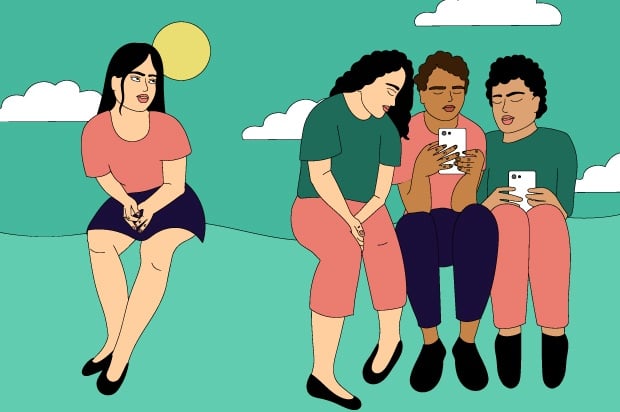Worried about bullying? Reach out for support
When you’re being bullied or if you think you might be bullying someone, reaching out for support can feel scary or overwhelming. But we’re here to tell you that you don’t have to cope with bullying alone, there are plenty of places you can find support and asking for help is the first step towards solving the problem and feeling safer. Here are a few tips for reaching out when you’re worried about bullying:
- Try speaking with your parents or carers about what has been happening. If you’re daunted by the idea of telling them in person then you could write it down in a letter, or send them a Whatsapp or text.
- Your school has a duty to support you and every school has an anti-bullying policy, which outlines your school’s approach to bullying, so if you speak to a teacher or school staff they will take it seriously and help you with the next steps.
- Does your school have a Pastoral Lead or School Nurse/ Guidance Counsellor who you could speak to? Remember, they’re there to support you no matter what you may be going through or feeling.
- If the bullying behaviour is happening in the workplace, get advice from your trade union, from human resources or health and safety officers at work.
- If you are experiencing bullying at university, you might want to speak to your campus counsellor, seminar tutor, SU representative, or any staff member you are comfortable talking to.
- The team at The Mix are there to offer free, non-judgemental and confidential advice on any issue that you’re facing. Contact our helpline, crisis text line or visit our hub to get support and information about how to cope with bullying, join their online group chat. Alternatively, you can sign up for up to eight sessions of free counselling.
What is cyberbullying?
Cyberbullying is bullying that takes place in any online space and can also be referred to as online bullying, or sometimes trolling. Cyberbullying might take place on social media, or perhaps on an online community space, within an online gaming platform or on a dating app. Cyberbullying can have a huge impact on someone’s life and should be taken just as seriously as other forms of bullying.
Some examples of cyberbullying
- Getting nasty or threatening texts or emails
- People posting abusive messages to you on chatrooms, on your social networks, or using instant messaging services
- Having private videos or pictures of yourself posted online, or sent on to other people
- Someone taking on your identity online to deliberately mess with your life
- A hate site or a hate group being set up about you
- Being prank called
What would you say to someone being bullied?
Bullying can be distressing and it can make life feel really difficult, but it’s not your fault and you deserve support. Watch our video, created with Molang, to hear our message of hope for anyone who is experiencing bullying. One kind word can make a huge difference to someone who is being bullied.
Top articles
FAQs
What is bullying?
Bullying is usually repeated behaviour, designed to inflict emotional or physical pain. Bullying isn’t always obvious to everyone around you. It can happen in many different spaces – at school, online, at work, at home, or at university. You can be bullied by your friends, someone in your family, someone you know, or sometimes by people you have never met.
Some examples of bullying behaviour:
- Being called names
- Punching, biting, kicking, or other physical violence
- Being excluded from conversations or social events
- Having your possessions stolen
- Being blamed for things you didn’t do
- Being sent hurtful messages
- Upsetting rumours being started about you
If you are experiencing any form of bullying or if you have been accused of bullying behaviour, you deserve support. Speak to our team today to take the first step towards finding help.
How can I support a friend who is being bullied?
If you’re worried about a friend, the best approach is to gently let them know that you are concerned about their wellbeing. Be sensitive and pick a time when you won’t be interrupted. Listen to what they say and support their wishes. If they are being bullied, remind them that help is available and that having told you is the first step towards getting help.
Face bullying together
- Identify when and where the bullying is happening and make sure you – or someone else – is accompanying them at these times.
- Stick up for your friend if you see them being bullied.
- Encourage them to report the bullying to someone else (you could offer to go with them).
- Keep offering your support, even after the bullying stops.
How can I find support for bullying at school?
If you’re struggling with bullying, speaking out can be really hard, but the first step is speaking out to find help and support. Speak to a teacher you trust, or perhaps another staff member, such as a teaching assistant or a nurse. The school has a duty of care to support your wellbeing and to take your concerns seriously.
It would also be helpful to tell your parents or carers what’s going on so they can support you too. If you can’t find the support you need at school then there are lots of other ways to find support. Read this article to find out more.
Where else can I find support for bullying?
Get in touch with the team at The Mix who are there to offer free, non-judgemental and confidential advice on bullying and any other issue. Contact our helpline or crisis text line to get support and information about how to cope with bullying, join our online group chat or sign up for up to eight sessions of free counselling.
You can also find support and friendship from other young people who are going through the same thing you are by joining The Mix’s online discussion boards.









